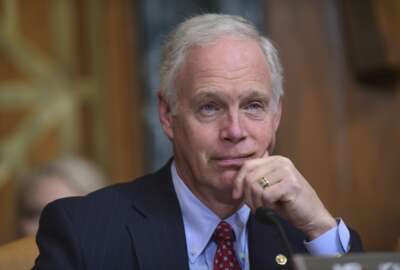
Kilmer: It’s ‘well past due’ for Congress to modernize
A new select committee is tasked with finding ways to update how Congress conducts day-to-day business. It has one year to provide recommendations.
Best listening experience is on Chrome, Firefox or Safari. Subscribe to Federal Drive’s daily audio interviews on Apple Podcasts or PodcastOne.
House Speaker Nancy Pelosi finished naming members to the Select Committee on the Modernization of Congress just last week. The bipartisan committee has no legislative authority, but is tasked with conducting public hearings to discuss ways to update the way Congress conducts day-to-day business. Committee Chairman Derek Kilmer (D-Wash.) says it’s about time.
“It’s probably well past due for Congress to have a committee like this,” Kilmer said on Federal Drive with Tom Temin. “The committee was established with the passage of the rules package and tasked with some specific issues to look at in hopes of making the organization a higher-performing one.”
On Feb. 12, Rep. Tom Graves (R-Ga.) was inducted also as Republican leader and co-chair of the bipartisan committee.
The other 10 members include: Reps. Zoe Lofgren (D-Calif.), Rodney Davis (R-Ill.), Susan Brooks (R-Ind.), Rob Woodall (R-Ga.), Emanuel Cleaver (D-Mo.), Mary Gay Scanlon (D-Pa.), William Timmons (R-S.C.), Suzan DelBene (D-Wash.), Dan Newhouse (R-Wash.) and Mark Pocan (D-Wis.).
Congress does something similar every 20 to 30 years in order to evaluate what’s working and what isn’t — Kilmer said in many ways, Congress tries to be a “fixer-upper.” This committee is the most recent attempt to try to make the process more transparent and more open.
Tech, recruitment, retention
In its beginning stages, the committee will consult everyone from think tanks to academia to assess the current procedures and rules within Congress and make recommendations.
Kilmer told Federal News Network’s Jason Miller that one area the committee will mostly likely prioritize is technology modernization.
“That’s an issue frankly where you’ve seen a lot of member interest on that, both from the standpoint of cybersecurity, but also how Congress uses innovation,” Kilmer said. “Both to engage one another, to engage our staff to try to serve the American people, and even how we engage with the American people through the use of innovative technologies. Congress is behind the curve on that front.”
Related Stories

New VA committee chair looking into ‘Mar-a-Lago crowd’ influence at agency

Senate committee clears 2 nominees, but for now leaves MSPB’s future hanging by a thread
Recruitment plays a large part in how effective a member’s staff will be. This is especially noticeable when staff members tend to be younger. Kilmer said Congress is notorious for the lack of retention when it comes to committee or personnel staff. He said there’s not a position in the House where the median tenure is longer than four years.
“There’s just tremendous turnover that happens,” he said. “Looking at the drivers of that, what’s leading to that level of turnover [and] trying to get some understanding of how Congress can build some additional institutional capacity so that we can, as an institution, solve problems … I think is important.”
He said this is one reason why lobbyists and outside interest groups — and even the executive branch — have far more authority and trust from the public than Congress.
Goals, timeline
The committee has been given about a year to produce recommendations. Each suggestion will require a two-thirds vote and then the members will be required every 90 days to provide progress updates.
Kilmer said he doesn’t anticipate the committee taking the full year to start making changes, or recommendations. There could be “low-hanging fruit” that the committee could take action on early in the process.
“It’s strange to be part of an organization that, according to recent polling is less popular than head lice and colonoscopies — I think ranking just above Nickelback,” Kilmer said. “I think there’s a real zeal for trying to fix some of the things that are problematic about the institution with the most important hoping that this institution can better serve the American people and that the people who are elected here can do a better job of representing their constituents.”
Copyright © 2024 Federal News Network. All rights reserved. This website is not intended for users located within the European Economic Area.
Steff Thomas is a digital editor at Federal News Network.



